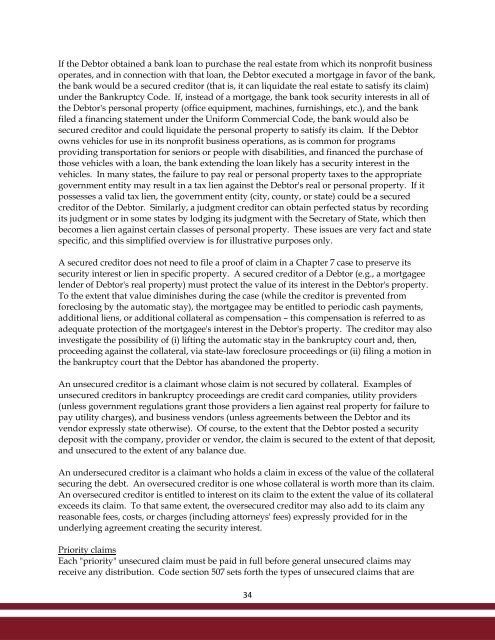Guide-for-Nonprofit-Organizations-Bankruptcy-Issues-FINAL-with-ads
Guide-for-Nonprofit-Organizations-Bankruptcy-Issues-FINAL-with-ads
Guide-for-Nonprofit-Organizations-Bankruptcy-Issues-FINAL-with-ads
- No tags were found...
You also want an ePaper? Increase the reach of your titles
YUMPU automatically turns print PDFs into web optimized ePapers that Google loves.
If the Debtor obtained a bank loan to purchase the real estate from which its nonprofit businessoperates, and in connection <strong>with</strong> that loan, the Debtor executed a mortgage in favor of the bank,the bank would be a secured creditor (that is, it can liquidate the real estate to satisfy its claim)under the <strong>Bankruptcy</strong> Code. If, instead of a mortgage, the bank took security interests in all ofthe Debtor's personal property (office equipment, machines, furnishings, etc.), and the bankfiled a financing statement under the Uni<strong>for</strong>m Commercial Code, the bank would also besecured creditor and could liquidate the personal property to satisfy its claim. If the Debtorowns vehicles <strong>for</strong> use in its nonprofit business operations, as is common <strong>for</strong> programsproviding transportation <strong>for</strong> seniors or people <strong>with</strong> disabilities, and financed the purchase ofthose vehicles <strong>with</strong> a loan, the bank extending the loan likely has a security interest in thevehicles. In many states, the failure to pay real or personal property taxes to the appropriategovernment entity may result in a tax lien against the Debtor's real or personal property. If itpossesses a valid tax lien, the government entity (city, county, or state) could be a securedcreditor of the Debtor. Similarly, a judgment creditor can obtain perfected status by recordingits judgment or in some states by lodging its judgment <strong>with</strong> the Secretary of State, which thenbecomes a lien against certain classes of personal property. These issues are very fact and statespecific, and this simplified overview is <strong>for</strong> illustrative purposes only.A secured creditor does not need to file a proof of claim in a Chapter 7 case to preserve itssecurity interest or lien in specific property. A secured creditor of a Debtor (e.g., a mortgageelender of Debtor's real property) must protect the value of its interest in the Debtor's property.To the extent that value diminishes during the case (while the creditor is prevented from<strong>for</strong>eclosing by the automatic stay), the mortgagee may be entitled to periodic cash payments,additional liens, or additional collateral as compensation – this compensation is referred to asadequate protection of the mortgagee's interest in the Debtor's property. The creditor may alsoinvestigate the possibility of (i) lifting the automatic stay in the bankruptcy court and, then,proceeding against the collateral, via state-law <strong>for</strong>eclosure proceedings or (ii) filing a motion inthe bankruptcy court that the Debtor has abandoned the property.An unsecured creditor is a claimant whose claim is not secured by collateral. Examples ofunsecured creditors in bankruptcy proceedings are credit card companies, utility providers(unless government regulations grant those providers a lien against real property <strong>for</strong> failure topay utility charges), and business vendors (unless agreements between the Debtor and itsvendor expressly state otherwise). Of course, to the extent that the Debtor posted a securitydeposit <strong>with</strong> the company, provider or vendor, the claim is secured to the extent of that deposit,and unsecured to the extent of any balance due.An undersecured creditor is a claimant who holds a claim in excess of the value of the collateralsecuring the debt. An oversecured creditor is one whose collateral is worth more than its claim.An oversecured creditor is entitled to interest on its claim to the extent the value of its collateralexceeds its claim. To that same extent, the oversecured creditor may also add to its claim anyreasonable fees, costs, or charges (including attorneys' fees) expressly provided <strong>for</strong> in theunderlying agreement creating the security interest.Priority claimsEach "priority" unsecured claim must be paid in full be<strong>for</strong>e general unsecured claims mayreceive any distribution. Code section 507 sets <strong>for</strong>th the types of unsecured claims that are34


